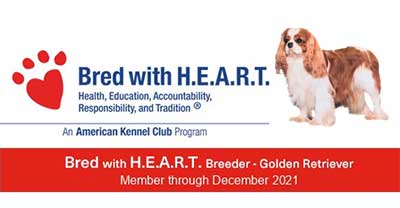Cavalier King Charles Spaniel
Breed Health Issues

In the process of producing any purebred animal, it is necessary to do a certain amount of inbreeding. Although this is necessary to produce the desirable traits of the breed, it also tends to increase the incidence of certain health problems. Fortunately, if a disease is genetic, the probability that it will occur can be minimized by testing the parents that are used for breeding.
In Cavaliers, there are five major health concerns for which we can test the parents:
Heart Disease
Cavaliers are susceptible to mitral valve disease, a condition that causes one of the heart valves to leak blood backward, forcing the heart to work harder in order to circulate the blood. It shows up as a murmur, which can be detected by a canine cardiologist. Nearly every Cavalier will develop a heart murmur after age 10, but it is a particularly debilitating condition if it shows up before age 5.
Eye Problems
There are several genetic eye diseases particular to the Cavalier, including cataracts and retinal dysphasia. After age 2, we have our bitches cleared by a canine ophthalmologist, and repeat those examinations on a yearly basis.
Hip Dysphasia
This condition, in which the top of the thigh bone does not fit tightly into the cup of the hip, can cause anything from minor discomfort to severe lameness in the dog’s rear end. Hip dysphasia can only be properly detected by an X-ray taken after the age of 2, and the X-ray must be evaluated by a properly trained specialist. WE will only breed the bitch if we receive a passing rating of Excellent, Good, or Fair. Hip X-rays need not be repeated yearly; a single X-ray taken after age 2 is an excellent indicator of the presence or absence of hip dysphasia.
Patellar Luxation
This condition is present when the kneecap on the dog’s rear leg becomes dislocated and slips out of its proper position. In its most severe form, it can be a crippling disease and may require surgery for the dog to lead a normal life. This is the only genetic condition that can be easily detected by a veterinarian, and should be tested for annually, as we do for our breeding Cavaliers.
Syringomyelia (SM)
SM is caused by a malformation in the back of the skull, which disrupts the normal flow of cerebrospinal fluid between the brain cavity and the spinal cord. This blockage causes pockets of fluid (syrinxes) to form in the spinal column, and symptoms can range from a mild itch (manifested by phantom scratching) to severe pain. Mild cases are often mistaken for allergies or skin problems, and, if properly diagnosed, can be managed with medication. The most severely affected dogs, however, may require expensive and risky surgery. While the only reliable method of diagnosing SM is by doing an MRI, there is presently no way to reliably tell whether a non-symptomatic dog will produce puppies with the disease. SM is thought to be an inherited condition caused by a combination of various genes, but the research is still in its early stages. We believe in keeping careful track of our puppies to determine if any come up with symptoms of SM, which will usually show up by age 3 or 4. We will not breed a bitch whose puppies are symptomatic.


